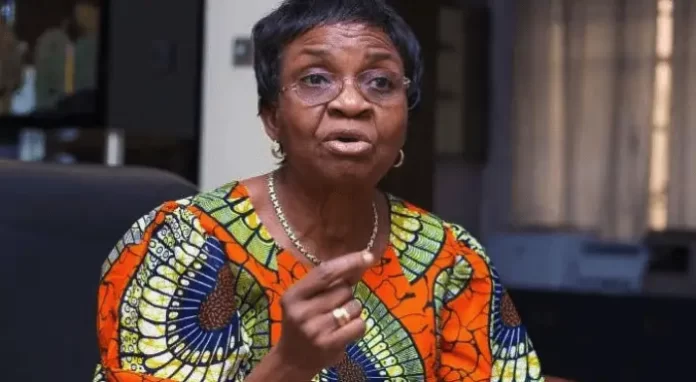The National Agency for Food and Drug Administration and Control (NAFDAC) has warned against the importation of syringes from foreign countries, saying the act may kill local pharmaceutical industries.
This is contained in a statement signed by NAFDAC Director-General, Prof Mojisola Adeyeye, and made available to newsmen in Abuja on Sunday.
Adeyeye admonished members of the new executive of the Association of Nigerian Licenced Customs Agents (ANLCA), who were on a courtesy visit to her office in Lagos, to think more about the country’s interests than personal matters as clearing agents in the nation’s ports.
She enjoined the agents to join forces with the NAFDAC to end the rejection of Nigerian food exported to the EU, USA, and other Western countries.
She also narrated how she marvelled at the stupendous investments committed to the local production of syringes in Nigeria by a local pharmaceutical company during a recent facility tour.
The NAFDAC boss said that the standard of the facilities she met on the ground was comparable to those found in the U.S. or any country in Europe.
She said after the facility tour and being led into the warehouse, she was highly disturbed at the sight of huge unsold products.
She said that over 1.5 billion units of the product were lying untouched in the warehouse due to low sales, exacerbated by the influx of imported syringes into the country, despite the high import duty slammed on the product to protect the local market.
She also noted with regret that intelligence reports reaching her indicated that some compromises were being made at the port of entry in allowing the illegal importation of unregistered containers of syringes into the country.
The NAFDAC D-G revealed that a publication by the United States Food and Drug Agency (USFDA) stated that some syringes that came from Southeast Asia were of bad quality.
Adeyeye wondered why those products didn’t fly by night into warehouses in Nigeria but through individuals.
The NAFDAC boss expressed sympathy for manufacturers, stating that she was pained by the challenges of not making sales, especially after investing a significant amount of money.
Adeyeye explained the important role of licenced customs agents as pivotal in facilitating the legal and safe import and export of goods and ensuring compliance with required standards.
She welcomed the familiarisation visit, highlighting its objective of establishing effective collaboration and cooperation.
She said the visit would enhance the positioning and promotion of trade in regulated products, both domestically and internationally.
She also noted that the visit and discussion were important, considering the volume of food and agricultural commodities from Nigeria, which is currently facing challenges of rejection at entry points in some foreign countries.
‘’Nigeria has lost billions of naira in trade that could have benefited our people.
“About 70 per cent of our exports are rejected, food products especially; all these rejected products did not go through NAFDAC regulatory assessment, which disgraces us as a country.
She said further that it had become a great issue of concern with the number of substandard products coming into the country.
“That is why I attach importance to this association because the goods that are either imported or exported often play a crucial role in determining the strength of our economy.
In the area of exports, she said the international market was competitive.
According to her, only products of high quality with relevant certifications and quality packaging were acceptable for global trade.
She noted with dismay that the problem of quality, standard, certification, and appropriate packaging for made-in-Nigeria products destined for export had been an issue in the international market.
She, however, emphasised the need to address the issue of rejections, adding that some exporters obtained the wrong documentation, especially fake lab results, instead of bringing their products to NAFDAC’s ISO 17025:2015-accredited labs for analysis.
According to her, NAFDAC is the competent authority in Nigeria charged with the responsibility to regulate and control the manufacture, importation, exportation, distribution, advertisement, sale, and consumption of drugs, food, and other regulated products.
“NAFDAC, having attained the ISO 9001:2015 Quality Management Systems that cover all her regulatory processes and procedures and certified WHO GBT maturity level 3, places a great premium on deepening the use of science in its regulatory processes and self-development.
“The D-G, however, pointed out that the agency believed in collaborative efforts with both local and international organisations to complement her robust regulatory policies geared towards protecting consumers and promoting public health.
She also said that the agency was committed to ensuring that only regulated products and the systems for their production were safe for public consumption.
According to her, the agency has analysed the Rapid Alert System for Food and Feed (RASFF) alert from the EU and observed that most rejected products by the EU, having failed the relevant tests, did not have the appropriate documentation or certifications.
She said that such a situation called for proper collaboration and synergy among all stakeholders to curb the negative behaviour of some of those exporters and ensure only quality and certified products were exported.
Adeyeye told the guests that as licenced custom agents, they were responsible for letting their members know the importance of assessment and accompanying shipping documents, adding that goods were cleared through customs with all necessary regulations.
The National President of ANLCA, Mr Emenike Nwokochi, who spoke in the same vein, lamented that it was shameful to buy yam abroad and be told that it was from Ghana when Nigeria was the highest producer of the product.
He said that Nigerians could not do anything to help the naira, even when it continued to fall.
He, however, pledged his association’s resolve to work in collaboration with NAFDAC to achieve the common goal of developing the nation’s economy.



